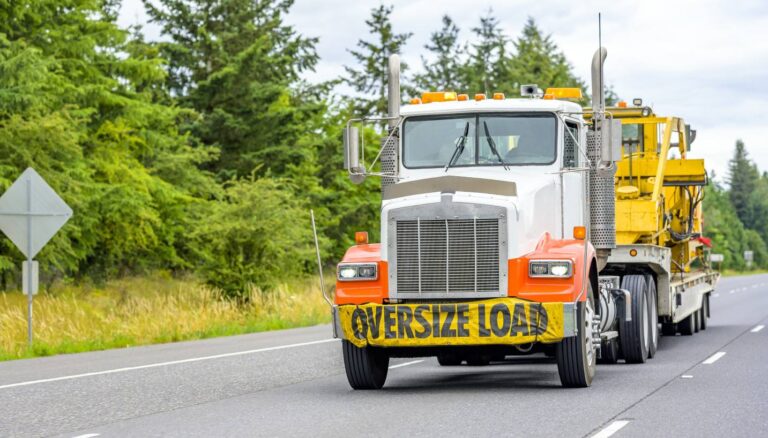What’s the next step in my life? Whether you’re thinking about your career, or your personal life, this could be considered the “eternal question.” It’s a question many professional drivers have hours to ponder as they pilot their vehicles for hours on end.
To be sure, some drivers are content to remain in their current jobs until retirement (if they retire at all). They’ve worked hard to achieve the record they’ve built, and they take pride in their safety and longevity on the road.
Other drivers, however, wonder what the next challenge will be. They’re always on the lookout for more skills to master.
The good news is that there’s plenty of room in the trucking industry for both of these mindsets.
Change of trailer + change of cargo = change of pace
With a huge number of available driving opportunities, drivers can advance their careers while keeping the same basic job of relocating freight. The type of freight — and the equipment needed to haul it — can change from job to job.
Drivers who are accustomed to dry van trailers, for example, might find hauling refrigerated freight to offer more challenges, both in terms of managing the cargoes and in pickup and delivery locations and processes.
For others, flatbed trucking is a new challenge with its unique cargo, securement responsibilities, and pickup and delivery locations. Drivers who prefer visiting rural locations rather than urban facilities often find flatbed work more enjoyable. Flatbed hauling can be more physical work, too, as loads require securing and some cargoes require tarping for protection from the elements. Flatbed trailers come in a variety of configurations, too, from one-level to drop-deck, double-drop, lowboy and other shapes and sizes.
Tanker work appeals to many drivers who like a challenge. Navigating a vehicle with high center of gravity, plus the way liquid cargoes can move, or “surge,” creates a different set of conditions than other forms of trucking. Many types of liquid and gaseous cargo are hazardous, requiring stricter credentials and more attention from the driver. On the other hand, loading and unloading tanker trailers can be faster and easier, depending on the cargo and location. Dry bulk tanks have their own characteristics, and some drivers prefer them to liquid tanks.
Dump trailers, whether they’re conventional hydraulic lift, hopper bottom, walking floor or other type, provide a variety of opportunities. Some jobs involving dump trailers are local, providing more home time for drivers. Others cover great distances, and drivers spend as much time over the road as dry van drivers.
Then, there are commercial vehicles that haul other vehicles. Auto hauling is a niche of trucking that some drivers prefer. There are additional responsibilities involved in loading, unloading and securing vehicle cargoes, and there will be lots of empty miles. Often, routes are regular and time at home can depend on the season and even the state of the economy.
Heavy-haul trucking often involves specialized equipment and careful planning for weight and its distribution. Often, special permits are needed for each jurisdiction travelled and escorts, either private or law-enforcement, are required for some loads.
To own or not to own (a truck, that is)
Some drivers choose the independence of owning their own trucks, and there are different ways to go about it.
The easiest way to gain ownership is probably a lease-purchase agreement with a carrier. Drivers benefit from lenient credit requirements and by purchasing equipment that is already set up for the carrier’s freight and system. Often, there is little or no down payment. The driver pays the carrier a specified amount per week or per month — and after an agreed-upon time period is met, the driver owns the truck.
Another benefit of this type of arrangement is that the leases are often “walk-away.” If it turns out the driver doesn’t like the truck (or the job), the carrier still owns the truck, and the driver can go back to being a company driver or pursuing another type of work.
There can be downsides to the lease-purchase arrangement, too, however.
Less-scrupulous carriers may use these agreements as a way to profit more from the leasing of used equipment than they would get by trading it in or selling it outright. Drivers who drop out of the program don’t keep any equity in the truck, even if they’ve paid far more than the truck’s value on the market. Some carriers have been accused of deliberately reducing dispatched miles or imposing payment conditions drivers can’t meet in order to get their truck back to lease to another driver. The Federal Motor Carrier Safety Administration (FMCSA) has established a Truck Leasing Task Force that’s conducting a study of the practice and whether it is fair to participants.
Of course, a driver can simply buy a truck (or two, or more) and become owner-operators. Most new-truck dealers also sell used equipment, and some dealers specialize in pre-owned units, offering financing at lower rates and even business courses for new owners.
Companies that rent or lease trucks often also sell them. Penske and Ryder both have used equipment sales divisions. An advantage to purchasing a previously leased truck is that the vehicle has been maintained according to the leasing company’s standards and the maintenance history is usually available.
Publications such as Commercial Truck Trader list thousands of tractors, trailers and smaller trucks. Drivers who are looking for a specific model or specifications may find the perfect vehicle here, as equipment is offered by all types of dealers and owners. Availability and types of financing and other considerations can vary between sellers, so it pays to do the research and ask questions.
Start with a plan
Before buying any truck through any means, however, the driver needs to have a plan of what to do with it. Leasing your truck to a carrier as an independent contractor (IC) is an option that allows the owner to benefit from the carrier’s ability to find freight, collect invoices, meet regulatory safety requirements and more.
The most “independent” option is registering as a carrier with the FMCSA and developing a list of customers. This means taking on all the elements of a trucking business, and it should not be entered into without proper preparation.
Finally, for those who desire to get out of the cab while remaining in trucking, there are positions in instructing, safety, operations and more available at carriers. Depending on the driver’s domicile, many carriers can benefit from the driver’s experience and knowledge of how things work on the road.
And, of course, there’s another option — and one that I’ve discovered personally: Drivers who are good at storytelling and writing down their experiences could even find themselves writing for a respected trucking news outlet like The Trucker Media Group!
Cliff Abbott is an experienced commercial vehicle driver and owner-operator who still holds a CDL in his home state of Alabama. In nearly 40 years in trucking, he’s been an instructor and trainer and has managed safety and recruiting operations for several carriers. Having never lost his love of the road, Cliff has written a book and hundreds of songs and has been writing for The Trucker for more than a decade.














